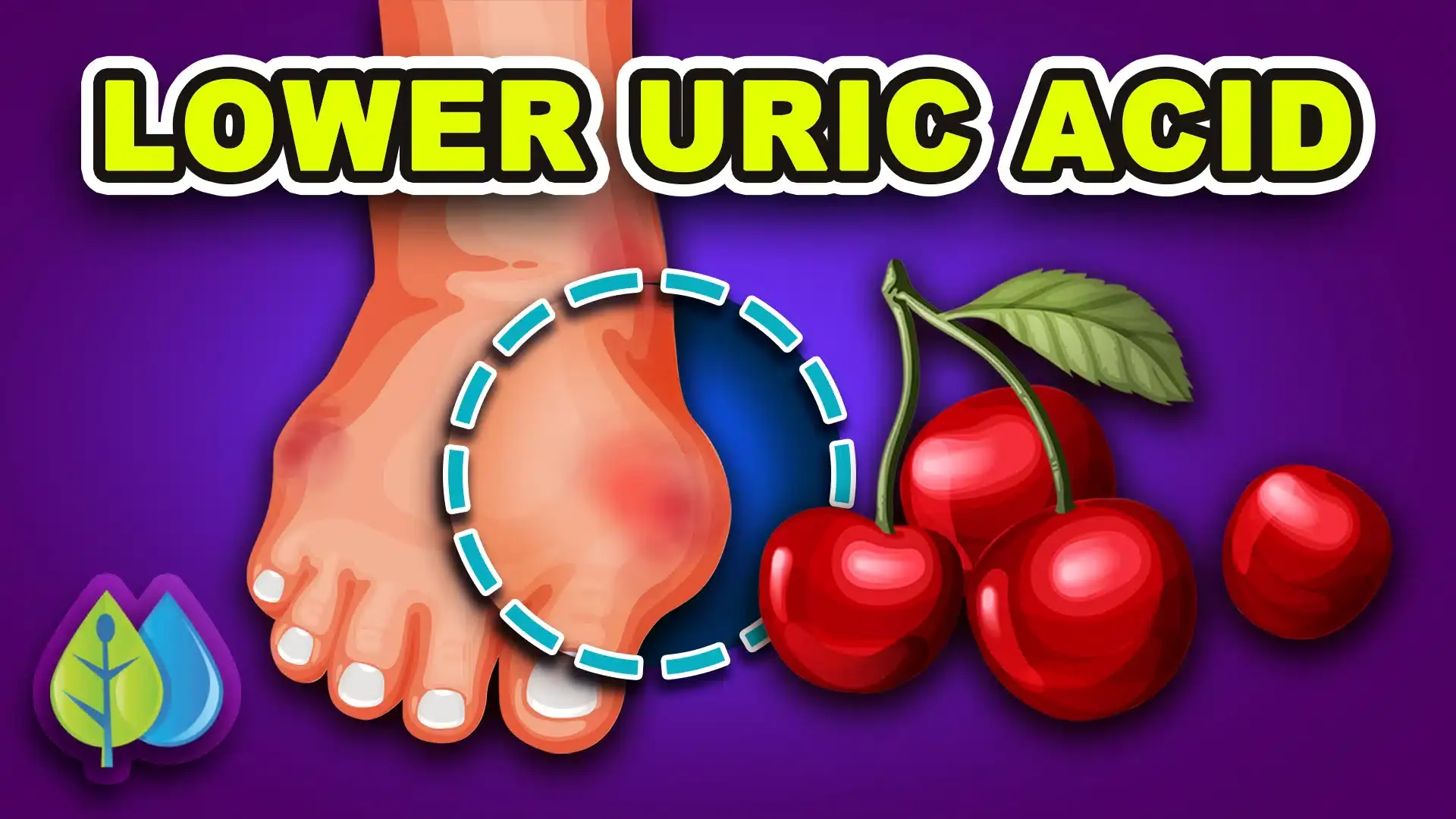
10 Ways to Lower Uric Acid Naturally
High uric acid levels (hyperuricemia) can do more than trigger painful gout attacks—they may also increase your risk of developing kidney stones and other metabolic complications. While medication is sometimes necessary, many people can support healthy uric acid levels through simple, evidence-based lifestyle and dietary changes.
In a previous article, we discussed the importance of limiting purine-rich foods, alcohol, and high-fructose corn syrup to reduce uric acid buildup. In this guide, we explore 10 natural, research-backed strategies that may help you lower uric acid and reduce the likelihood of gout flare-ups.
10. Cherries: A Powerful Natural Ally
Cherries are among the most effective natural foods for managing uric acid levels. They appear to work in multiple ways: increasing kidney filtration, reducing uric acid reabsorption, and lowering systemic inflammation.
Cherries are also a natural source of xanthine oxidase inhibitors, similar to those used in certain gout medications. Additionally, they contain high levels of quercetin, a plant compound shown to help reduce uric acid levels in some studies.
What gives cherries their rich red color—anthocyanins—also provides strong antioxidant and anti-inflammatory benefits, helping to reduce uric acid production. In fact, some research suggests that consuming at least 240 ml (8 oz) of cherry juice daily for four weeks can significantly lower uric acid levels.
9. Vitamin C: A Simple but Effective Nutrient
Increasing your intake of vitamin C may be another practical way to lower uric acid levels. Foods such as kiwi, strawberries, bell peppers, and citrus fruits are all excellent natural sources.
Multiple metabolic studies and clinical trials have shown that vitamin C supplementation can significantly reduce serum uric acid levels. One notable study published in Arthritis & Rheumatism found that participants who took 500 mg of vitamin C daily for two months experienced a measurable decrease in uric acid levels compared with a placebo group.
However, individuals with a history of kidney stones should consult a healthcare professional before increasing vitamin C intake significantly.
8. Coffee: Surprisingly Protective
Coffee is often misunderstood in the context of gout. While many people worry it may worsen inflammation, research suggests the opposite may be true.
Coffee contains chlorogenic acid, a potent antioxidant that can reduce insulin resistance and help lower uric acid levels. In a large study, men who drank 4–5 cups of coffee per day had a 40% lower risk of developing gout compared with those who didn’t drink coffee. Other research has linked regular coffee consumption with lower uric acid levels and fewer instances of hyperuricemia.
7. Hydration: One of the Simplest Solutions
Proper hydration is essential for overall health—and absolutely critical when trying to control uric acid levels. Drinking enough water helps your kidneys flush excess uric acid from your body through urine.
In addition to water, low-fat milk has been shown to reduce uric acid production and increase its excretion, making it a useful beverage choice for people prone to gout.
6. Weight Loss: A Long-Term Solution
Carrying excess weight places additional strain on the kidneys, making it more difficult for them to eliminate uric acid efficiently. Fat cells also naturally produce more uric acid than muscle cells.
Studies show that obese individuals have up to 10 times the risk of developing gout compared with those at a healthy weight. A 2017 study involving over 4,000 participants found that people who lost more than 10 kg (22 lbs) over two years experienced significant decreases in uric acid levels.
5. Balance Insulin Levels
Insulin helps regulate blood sugar, but chronically high insulin levels (common in insulin resistance) can reduce the kidneys’ ability to excrete uric acid. This can cause uric acid to accumulate in the bloodstream.
To keep insulin levels stable, it’s best to limit sugary foods, refined carbohydrates, and highly processed snacks. A whole-food, balanced diet can help regulate both insulin and uric acid more effectively.
4. Increase Dietary Fiber
Consuming at least 5–10 grams of soluble fiber daily can significantly improve blood sugar control and prevent insulin spikes. Since high insulin levels hinder uric acid elimination, eating more fiber can indirectly support lower uric acid levels.
Fiber also promotes fullness, which helps prevent overeating and unwanted weight gain—another important factor in managing uric acid production.
3. Reduce Stress
Chronic stress and anxiety are often overlooked contributors to gout attacks. High stress levels are associated with increased inflammation and elevated uric acid levels.
Practices such as deep breathing, meditation, gentle yoga, or even spending time in nature can help reduce stress hormones and support overall metabolic balance.
2. Exercise Regularly
Although gout attacks can be painful and last from 3 to 10 days, the time between flare-ups is crucial for prevention.
Regular physical activity helps lower systemic inflammation, promotes a healthy weight, and improves insulin sensitivity—all of which can help reduce uric acid levels.
If you’ve recently experienced a gout attack, consider low-impact exercises such as swimming, using an elliptical machine, or stationary cycling, which are easier on the joints while still providing cardiovascular benefits.
1. Review Medications With Your Doctor
Some commonly prescribed medications can increase uric acid levels. These include:
-
Diuretics
-
Certain immunosuppressants
-
Niacin
-
Chemotherapy drugs
-
Low-dose aspirin
If you are taking any of these medications and struggle with high uric acid or gout, speak with your healthcare provider. In some cases, safer alternatives may be available.
Understanding the Real Causes of Gout
It’s a common misconception that diet alone causes gout. In reality, genetics and family history play a much larger role in determining uric acid levels than diet alone.
A 2018 study published in The BMJ confirmed that genetic factors have a stronger influence on uric acid levels than individual dietary choices. Other contributing factors include weight, medical history, medications, hydration levels, and metabolic health.
This does not mean diet is unimportant—but it does mean that occasional indulgences are unlikely to trigger a gout attack on their own if your overall lifestyle is balanced.
Final Thoughts
Lowering uric acid naturally requires a combination of healthy eating, smart hydration, weight management, stress control, and regular movement. These strategies don’t just help with gout—they also promote overall cardiovascular and metabolic health.
Remember: this information is intended for educational purposes only and should not replace advice from a licensed medical professional.
What steps are you taking to manage your uric acid levels naturally?
News in the same category


Could the bacteria in your nose be causing Alzheimer’s?

How to treat nerve pain in the foot, toes & legs

Bee venom wiped out 100% of aggressive breast cancer cells in just 6 hours

6 Foods That Can Drain Your Calcium and Weaken Bones

How to treat nerve pain in the foot, toes & legs …

Scientists identify the only two foods consistently linked to higher cancer risk

COULD THE BACTERIA IN YOUR NOSE BE CAUSING ALZHEIMER’S?

The Shocking Impact of Honey with Cloves on Your Health

Clear Your Lungs and Soothe Your Cough Naturally with Onion Remedy

Guava Leaf Tea: A Simple Habit With Powerful Health Benefits

The single move that instantly clears congestion and drains your sinuses

This common diabetes medication may undo the benefits of your workouts

Your legs have a “second heart” — and one simple move can reactivate it fast

9 cancer warning signs your body is sending you (don’t ignore these!)

Here’s the secret why everyone puts avocados on the fire!

Scientifically Proven Benefits of Pumpkin Seeds (Pepitas) and Pumpkin Seed Oil

The single move that instantly clears congestion and drains your sinuses

11 Health Warnings Your Fingernails May Be Sending
News Post

Vaseline Uses and Benefits for Skin, Lips, and Hair

10 simple ways to reduce dust at home that most people overlook

You’re Doing It All Wrong: Here’s the Right Way to Defrost Frozen Pipes

7 Powerful Fruits to Preserve Muscle Strength and Energy After 50

I Didn’t Know!

The #1 FASTEST way to reverse fatty liver naturally

Could the bacteria in your nose be causing Alzheimer’s?

How to treat nerve pain in the foot, toes & legs

The air conditioner only has wind but is not cool. Don't rush to call a repairman and waste money. If you do this, it will be cold.

The more flowers the money tree has, the more luck it attracts: Do this and the money tree flowers will grow 5 times faster.

When boiling duck, don't add ginger and cold water. Add this to remove all the bad smell from the meat and you won't get tired of eating it.

Avocado Seeds: The Overlooked Nutritional Power Inside the Fruit

Bee venom wiped out 100% of aggressive breast cancer cells in just 6 hours

A New Breakthrough: Magnetic Microrobots Designed to Navigate Blood Vessels and Stop Strokes

A Dual Climate Solution: Solar Panels Over Canals Could Save Billions of Gallons of Water

Regenerative Medicine Milestone: Stem-Cell Trial Restores Motor Function in Paralyzed Patients

From Crow to Cleaner: How Feathered Geniuses Are Fighting Litter in Spain

6 Foods That Can Drain Your Calcium and Weaken Bones
